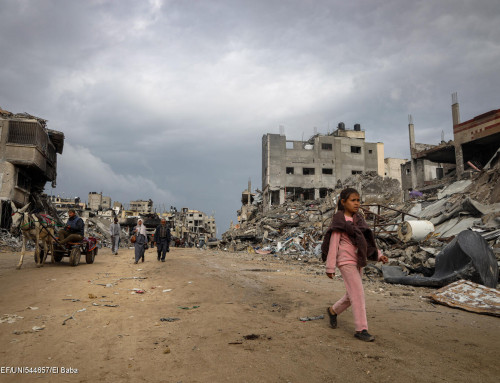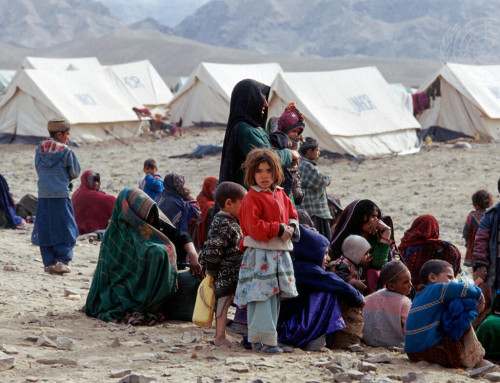Despite some progress and a noted decrease in grave violations against children, armed conflict continued in the Central African Republic. The vulnerability of Central African children to grave violations was exacerbated by retaliatory attacks against communities, including children for alleged support to opposing parties and the indiscriminate use of explosive ordnance by parties to the conflict, highlights a new report of the United Nations Secretary-General on Children and Armed Conflict in the Central African Republic.
The report highlights that 1,432 grave violations against 1,046 children were verified between 1 July 2021 to 30 June 2023. This represents a 14 percent decrease compared to the previous reporting period. However, access restrictions to areas of ongoing conflict may have contributed to a lower number of violations verified.
‘The sad reality is that children in the Central African Republic continue to be affected by the impact of armed conflict. We need to build on previous achievements but more importantly, we need to implement concrete child protection measures, including through action plans adopted between armed groups and the United Nations. It is critical for all parties to engage with the United Nations, including on a prevention plan to prevent grave violations against children and for the Government to adopt and implement a handover protocol of formerly associated children to civilian actors”, said the Special Representative of the Secretary-General, Virginia Gamba.
The recruitment and use of children remained the most verified grave violation despite a notable decrease of 16 percent from the previous reporting period, followed by abductions and sexual violence. Most grave violations were committed by armed groups and about 20 percent were attributed to government forces, other security personnel, and pro-government proxies.
The conflict in CAR continued to be appalling for children, with 155 children killed and maimed, triggered also by a worrisome increase in child casualties caused by explosive ordnance, particularly in Nana-Mambéré, Mambéré-Kadéi, Lim-Pendé and Ouham-Pendé prefectures. Throughout the reporting period, the humanitarian situation continued to deteriorate leading to an increasing number of people internally displaced and in need of humanitarian assistance. The delivery of humanitarian assistance was hampered by clashes between parties to the conflict and military operations. 116 incidents of denial of humanitarian access were verified by the United Nations during the reporting period. Following increased advocacy and awareness raising by the United Nations, the number of attacks on schools and hospitals decreased by 50 percent.
Progress for Children Amidst Challenges
The revitalization of the peace process which resulted in the dissolution of six armed groups, was welcomed by the Special Representative as a critical step to protect children from grave violations. The release and reintegration of children associated with armed forces and armed groups continued, even though at a smaller rate compared with the previous reporting period. The Special Representative welcomes the recent voluntary repatriation of LRA-ex combatants and their dependents, including 31 children from Haut-Mbomou prefecture to Uganda. The dire need for long-term socio-economic reintegration, educational and vocational programmes for Central African children remains evident but is hindered by the dual challenges of ongoing conflict and limited financial capacity for such initiatives. The joint initiative of the United Nations and the Government to establish a vocational training center in Ouaka Prefecture for conflict-affected children is a commendable step that should be replicated in other areas.
The report also highlights advancements, such as a national strategy to prevent grave violations against children under development by the Government of the Central African Republic, with United Nations support. Further, administrative efforts to counter child trafficking and increased accountability efforts at the domestic and international level reflect a commitment to addressing grave violations against children and to hold perpetrators accountable. Furthermore, the appointment of a Human Rights Focal Point within the État-Major of the Armed Forces is a positive step to mainstream child protection concerns within the national security apparatus.
“I call on parties to conflict to adhere to their obligations under international law, prioritize the protection of children, and take meaningful actions to end and prevent grave violation, not only to safeguard the futures of Central African children but also to contribute to the restoration of peace and stability in a country long marred by conflict. I also call on the international community to bolster its support, notably for mine action and reintegration, educational and vocational programs. The United Nations stands ready to support all efforts to better protect Central African”, children concluded Virginia Gamba.
**
Overview of Grave Violations
Total verified violations against children: 1,432
Recruitment and use: 713 children (544 boys, 169 girls)
Killing and maiming: 155 children (103 boys, 52 girls) were killed (61) and maimed (94).
Sexual violence: 184 children (183 girls with a girl victim of two separate incidents)
Abductions: 228 children (126 boys, 102 girls)
Attacks on schools and hospitals: 36 attacks on schools (19) and hospitals (17).
Denial of humanitarian access: 116 incidents.
************
For additional information, please contact:
Ariane Lignier, Communications Officer, Office of the Special Representative of the Secretary-General for Children and Armed Conflict (ariane.lignier@un.org)
Instagram: @nochildreninwar, Twitter: @childreninwar



